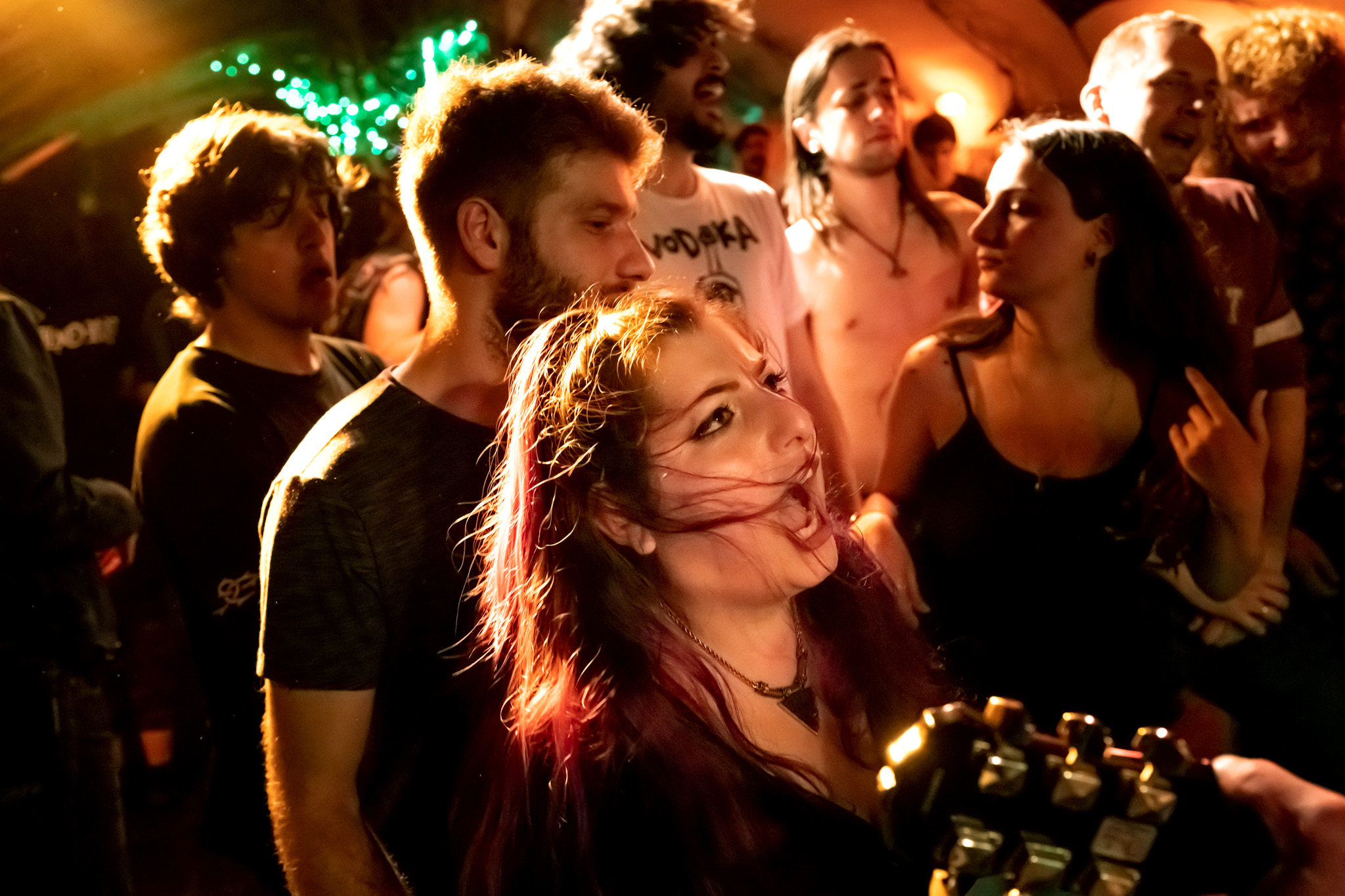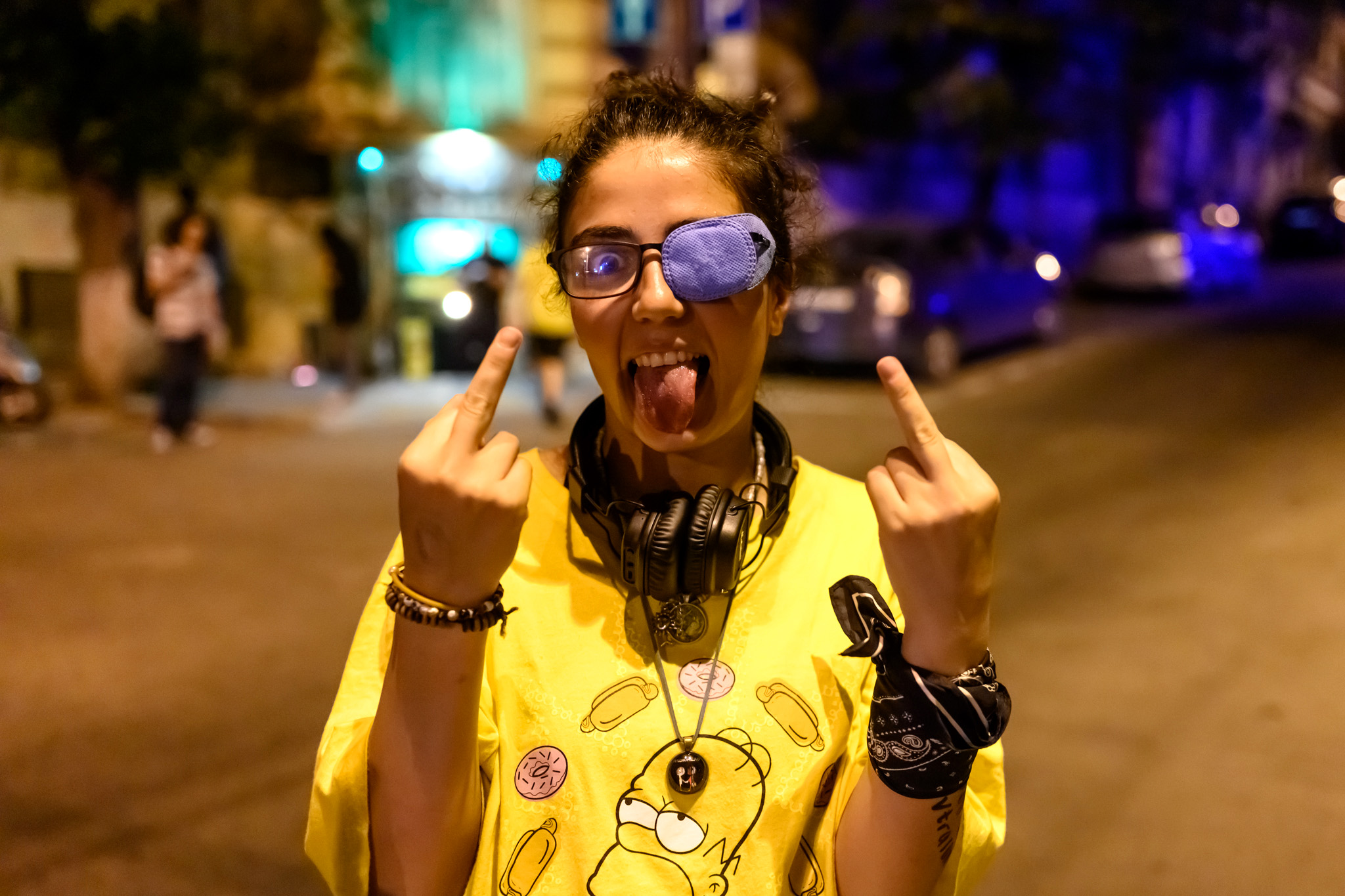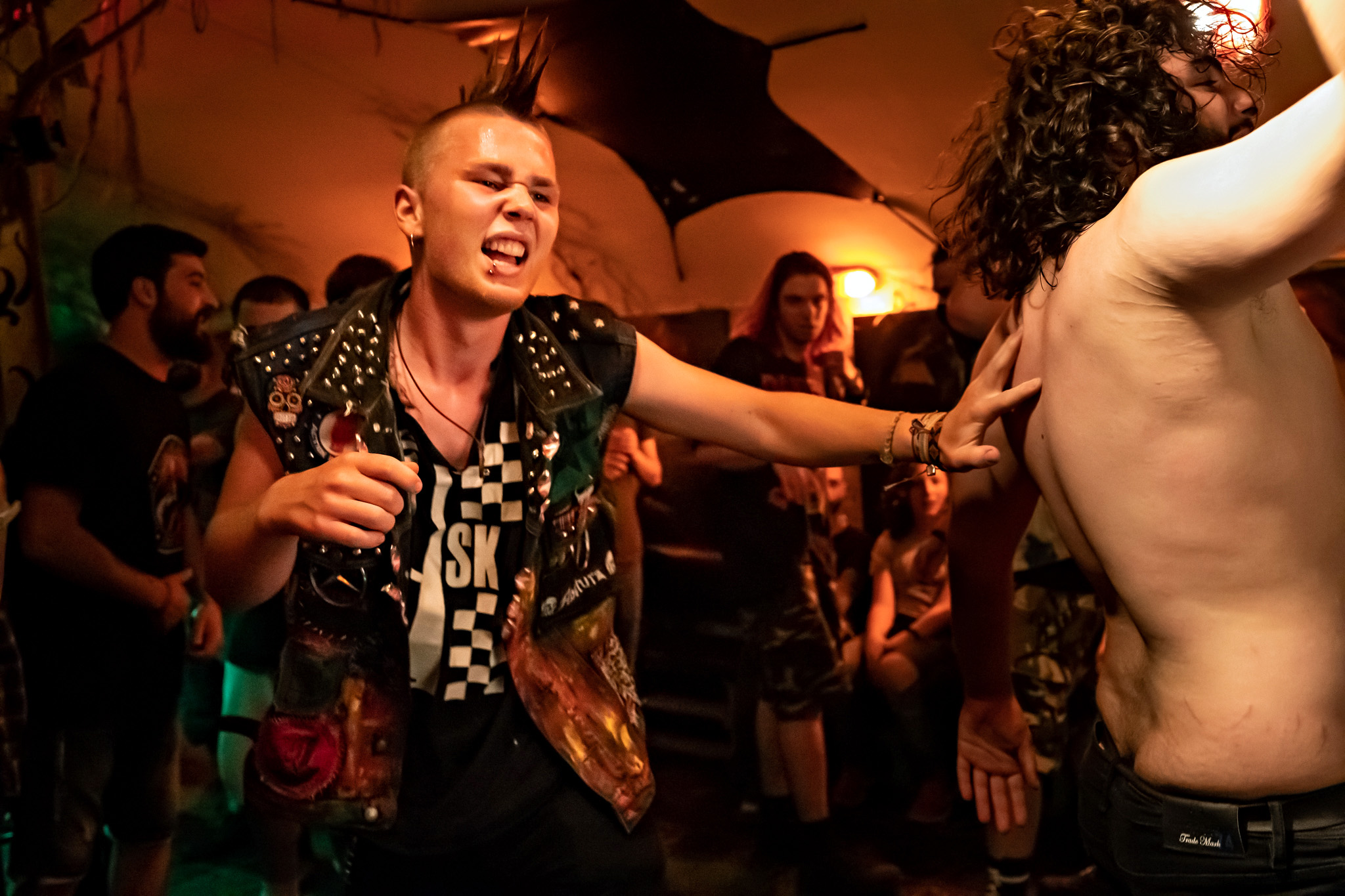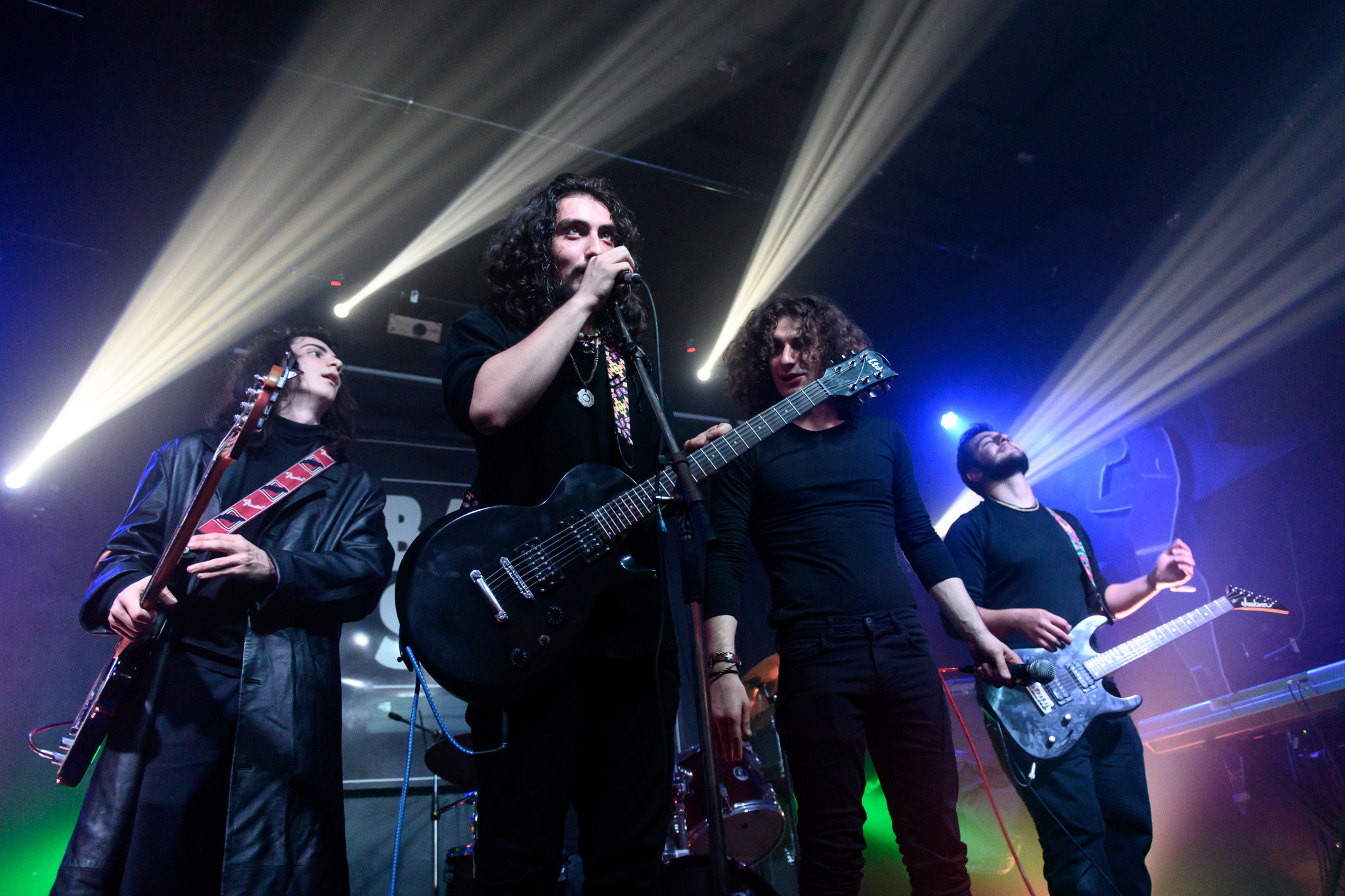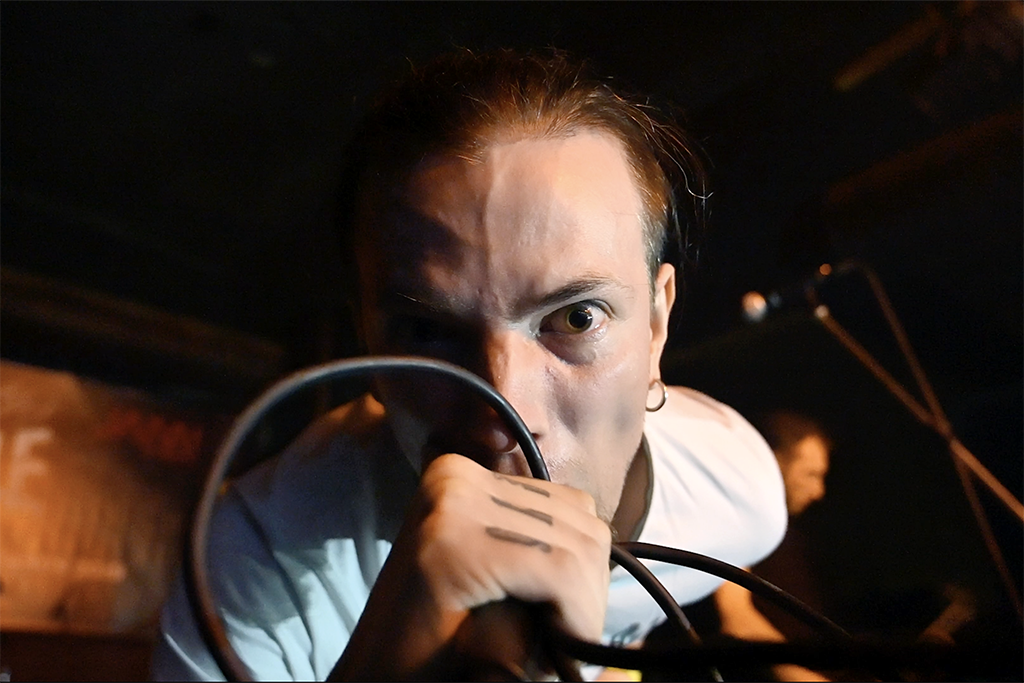
Graf von Baphomet (Photo © Onnik J. Krikorian) - One success story from the Georgian metal and punk scene is Psychonaut 4, a band that has achieved a strong following in the global Depressive and Suicidal Black Metal scene. Singing in English, Georgian, and Russian, the band have performed in 24 countries to date.
A brothel turned into rehearsal studio: this is one of the images that best describe Georgia's punk scene of the last 30 years. A reportage among punk and metal teenage fans, with photos, videos, and a coming soon documentary
“Come, let me show you an example of how Georgian machos were enjoying their lives in the 1990s,” says Dato Tsomaia, the Sukhumi-born drummer of veteran Georgian Punk Band Vodka Vtraiom. It’s January and Tsomaia is still wearing his coat as he walks through the dilapidated corridor linking a number of nondescript rooms in a cold and decrepit building hidden away behind Tbilisi’s Tumanishvili Theatre.
During the 1980s it was a cinema studio, says Tsomaia, but when Georgia declared its independence from the former Soviet Union in 1991 it became one of the most well-known brothels in the capital. Tsomaia, an internally displaced person (IDP) from Abkhazia, continues his impromptu tour of what can perhaps be considered an unintentional symbol of a chaotic social, economic, and political past.
The sound of rubble underfoot is the sole sound as he enters a pitch black room illuminated only by the flashlight from his phone. “There’s a Queen-sized bed with renaissance curtains,” he says, directing the beam. “And here’s a phone. Just pick it up and order champagne… or a girl.”
In the early 2000s, the cinema-studio-turned-brothel was transformed again, this time into a rehearsal studio.
Vodka Vtraiom was founded by Tsomaia and vocalist Levan Managadze, also born in Abkhazia, in 2004 and last year celebrated its 15th anniversary. Although Georgia always had an important punk scene since the late 1980s, and especially in the second largest city of Kutaisi, the situation has had its ups and downs, in recent years overshadowed by the arguably more mainstream electronic scene.
Smells Like Teen Spirit
Most of today’s punk and metal fans are teenagers, says Tsomaia. “I don’t know them all personally, but as I look at them I see they are very interested in rock music, punk music, metal music... any type of music that describes their rage. And I think they are finding in our music and in our lyrics something they are fighting for.”
Take Mako Gomuri for instance, a young Georgian who became the ‘face’ of months of daily pro-democracy protests that blocked one of Tbilisi’s main arteries, Rustaveli Avenue, throughout the summer and autumn last year.
Gomuri, then 19, went to pick up her sister from a spontaneous rally held outside parliament on 20 June 2019 in protest at the arrival of a Russian MP in Georgia. She was hit in the face by a rubber bullet as riot police dispersed the crowd in what many international observers considered an indiscriminate and disproportionate use of force.
She was quickly portrayed in the media as a hip girl, putting her into the last and only existing box for youngsters in Georgia: hipsters, supposedly loving electronic music and supporting the Bassiani movement. While she actually found more echo to her anger in rock music.
“I like any sub-genre of rock music,” says Gomuri, “but I started with post-Punk and I like it most of all. The first Georgian Punk band I listened to was Vodka Vtraiom. When they sing it feels as though they’re singing about you. It feels as though you are not alone and that someone understands you.”
In the past year the band have played a dozen gigs throughout Georgia though few Georgians will know their music apart from one satirical track, Gldaneli Katsi.
Gomuri now has a prosthetic eye and still attends punk and metal gigs in Tbilisi. One day she hopes to have her own band and is currently learning to play the drums under the tutorship of one of Georgia’s most prolific rock and metal drummers, Dimitri Oganesian. Following the incident, she finds it a powerful release.
“You can transfer any kind of emotion to a drum kit and you can release those emotions easily,” says Gomuri. “It’s a forceful instrument.”
Vodka Vtraiom also played a role in Gomuri getting her first drum kit. After she lost her eye last year, IDPs from Abkhazia living outside of Georgia collected money to contribute to her medical costs through Tsomaia. However, when the government agreed to cover them instead, one of his friends asked Mako’s what she wanted most of all. A drum kit was the response and Tsomaia tracked one down.
Into the ‘Underground'
Like the term “hipster”, “underground” is open for debate, and especially in the age of the Internet where any musical genre is just one or two clicks away. A key characteristic is that it is found away from the mainstream and is non-commercial in nature. Certainly, most Georgians and expats alike are unaware of the metal and punk music scene in Tbilisi while a sizeable number know of Bassiani, Khidi, and other electronic music clubs.
Moreover, if you want to seek out alternative rock music in the capital, you definitely need to know where to look. It’s not easy to stumble upon.
“Five years ago it was a stronger scene,” says Tsomaia. “There were a lot of punk bands and music clubs, but now it’s difficult again because electronic music became more popular. Many rock musicians became DJs and clubs closed because of the financial crisis. Punk and any live music went to the deep underground.”
One notable loss was Creator Bar, a do-it-yourself, alternative-themed drinking hole that hosted most of the rock, metal, and punk bands in the city until it closed in July last year following the untimely death of one of its co-owners, Maka Vekua. Given that most audiences for punk and metal music in Tbilisi are teenagers, the bar was operating at a loss. Following Vekua’s death, the other co-owner decided to sell.
Not surprisingly, in what still remains a transitional economy, Georgian teenagers have little to no disposable income of their own. Many instead drink cheap vodka or beer outside what venues do exist and some even sneak in to avoid the 5-10 Lari (€ 1.76-3.2) entrance fee. True to their punk credentials, bands such as Vodka Vtraiom do nothing to prevent it and even give tickets away for free.
In contrast, electronic music clubs in Tbilisi sell tickets for around 25-35 GEL (€8.1 - 11.5) in advance and 50 GEL ( €16) on the door. Face control also means that not everyone is allowed in.
Regardless, many bars that served as venues for live rock, metal, and punk music such as Rebus and Chaos have closed in the past year, leaving bands with few venues to play in. One bar, 12 Riders, even transformed itself into Pulsar, offering electronic music instead, although two small punk and metal festivals have since been held albeit only because one of its co-owners is a metal fan.
Some are trying to change the situation. Elektrowerk, for example, is an urban renewal project in an abandoned factory in an outlying district of Tbilisi. Hosting several international metal bands as well as local, a series of festivals were intended to re-popularise the rock, punk, and metal scene in Georgia. However, the problem of attracting an audience remains.
“I come from a small city in Sweden and even if you have a rock DJ in a small bar you can attract a hundred people,” says Terence McNamara, one of the organisers of the RedRum metal festivals at Elektrowerk. “Here in a city of 1.5 million it’s hard to gather 100 rockers. It confuses me a bit.”
Sandro Tskitishvili, a progressive rock music and part-time curator of Georgian contemporary music, isn’t so surprised.
“I think the answer is simple – the electronic music industry is pretty much the only industry that works both financially and productively in Georgia. There is a lot of [other] music here, but no industry.”
The Sound of Pain and Hate
That’s not to say, however, that there are no success stories from the Georgian punk and metal scene. One such example is Psychonaut 4. Formed 10 years ago, the band continues to tour Europe and elsewhere and is quite well known in the international Depressive and Suicidal Black Metal (DSBM) scene, even if that is a marginal genre among metal-heads.
Currently working on their fourth album, and true to their Georgian roots, the band calls their style “Post-Soviet Suicidal Black Metal,” last year also naming their international tour “From Tbilisi With Hate,” a tongue in cheek play on the capital’s motto of “The City That Loves You.”
David Lomidze, the band’s vocalist, better known as Graf von Baphomet and also a co-organiser of the RedRum festivals, says that the term “Post-Soviet” refers to their origins. Born at the very end of the Soviet Union and raised in the difficult years after independence, he says his generation was devastated by the social and economic upheaval that followed.
“When we started to play our music here in Georgia,” says Lomidze, “only a few people understood the style and most fans and listeners were from other countries. That’s the reality of Georgia. It’s a very underground genre and will never be a culture for the masses so I understand why lots of people don’t listen to our music.”
He also says that the prevailing mentality in the country is one where people are expected to hide their emotions. “Local people don’t like to be very open,” he says. “That’s why they don’t understand what we are doing. They understand, but they think that it’s not for them.”
Nevertheless, the band has performed in 24 countries even if they put the number of fans in Georgia at just 400-500. But when they do perform in Tbilisi, fans from Armenia and Azerbaijan even travel to attend them.
"We are connecting people from neighbouring countries,” says Lomidze. “People have to communicate with each other. That's how friendship and relationships between people are started. Music is connecting people."
Shotari Darakhvelidze, one of the band’s guitarists, gives his explanation of why electronic music is more popular than any metal genre in Georgia. “It’s regular,” he explains. “Friday, Saturday… You have Bassiani, you have Khidi. Go wherever you want. Plus, it’s fun, right? You pay for fun. Going to a Psychonaut 4 show is not fun. It’s… something else.”
“You can’t just do ecstasy and go to a Psychonaut 4 show because it doesn’t work that way,” he continues before pausing. “Well, you can, but it’s not going to be fun, that’s all I’m saying.”
Darakhvelidze breaks into a laugh, and gestures at Lomidze. “Seeing him cut himself [on stage]? Yeah, he used to do that.”
Psychonaut 4’s vocalist considers the band’s music to be therapy and that seems to be case for many of their fans too. “Everything we are talking about in our music we are talking about ourselves and it seems it’s interesting for the listener. They find something of themselves in our music and we are touching their souls and feelings. The stories in our music are regular human stories. There is no grotesque.”
Temo Gegia, bass player with the metal band Every Dog Has Its Day (EDHID) as well as his own musical side-project, Ink’d, agrees that music provides the younger generation with an outlet, especially as Georgia continues to wrestle with political, economic, and social uncertainty.
“It’s very nice to see kids in the audience instead of hanging out in the street doing drugs,” he explains, “because for the people that live here the stereotype is that when you listen to heavy metal you do drugs, but in reality it’s not like that. They enjoy themselves and they let out all their negative energy. I think heavy metal is a release valve.
All the stress we have on the street and in every day life… I think heavy metal helps you – and me personally – to get rid of all of the negative stuff.”
Nevertheless, says EDHID’s guitarist, Gio Kordzakhia, he often has doubts. “Georgia passed through a lot of critical stuff like war and even today I wonder why the hell am I playing.” he says. “I hope very much, but I do call this country a cemetery of undetermined and unrealised genius and talented musicians. There are a lot of those people here.”
“There is a lot of talent in Georgia and the potential is huge,” agrees Terence McNamara. “We’re just in that electronic wave right now.”
––
Onnik James Krikorian is a freelance journalist, photojournalist, and consultant from the UK based in Georgia. He is currently making a documentary film , Tbilisi Underground, about the metal and punk scene in Tbilisi. He can be followed on Twitter at @onewmphoto .
blog comments powered by







